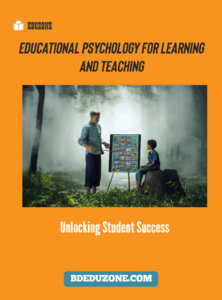Educational Psychology for Learning and Teaching is a field of study that applies psychological science to improve the learning process and promote educational success for all students. Psychologists in this field examine key concepts and issues in educational psychology, catering to individuals working with learners of all ages, from early childhood to adolescence and beyond.
By understanding how people learn and retain knowledge, educational psychologists contribute to the development of effective teaching strategies and personalized learning approaches. This field explores the development of learners over time, the learning process itself, and individual differences among learners.
Ultimately, the goal of educational psychology is to enhance teaching and learning outcomes for students of all backgrounds and abilities.
Role Of Educational Psychology In Student Success
Psychologists working in the field of education study how people learn and retain knowledge. They apply psychological science to improve the learning process and promote educational success for all students. Educational psychology is concerned with understanding the role of psychological principles in teaching and learning. By applying psychological theories and research findings, educators can enhance their teaching methods and create effective learning environments. Educational psychology also focuses on individual differences in learning, addressing the diverse needs of students and promoting inclusive education. It emphasizes the importance of considering developmental factors when designing educational programs and interventions. Ultimately, educational psychology aims to optimize the learning experience for students of all ages and backgrounds, facilitating their academic achievement and personal growth.
Importance Of Educational Psychology In Teaching And Learning
Educational psychology plays a crucial role in teaching and learning by enhancing the learning process through the application of psychological science. Understanding how learners learn and retain knowledge is essential for educators to create effective instructional strategies. By addressing individual differences in the learning process, teachers can tailor their approaches to meet the unique needs of each student. Educational psychology promotes teaching and learning by employing evidence-based practices and strategies that optimize student engagement and academic success.
Key Concepts In Educational Psychology For Student Success
Developmental theories of learning and cognition: In educational psychology, developmental theories focus on understanding how individuals acquire knowledge and skills as they grow and mature. These theories explore the cognitive, social, and emotional factors that influence learning and development. Some popular developmental theories include Piaget’s stages of cognitive development and Erikson’s stages of psychosocial development.
Learning styles and strategies: Educational psychology also examines different learning styles and strategies that individuals use to acquire and retain information. Learning styles refer to the preferred methods or approaches individuals use to learn, such as visual, auditory, or kinesthetic learning. Learning strategies, on the other hand, are the specific techniques or tactics individuals employ to enhance their learning process, such as note-taking, summarizing, or self-testing.
Motivation and engagement in the classroom: Motivation plays a crucial role in learning and educational psychology seeks to understand how to motivate students and promote engagement in the classroom. Different theories of motivation, such as Maslow’s hierarchy of needs and self-determination theory, provide insights into the factors that drive individuals to learn and achieve their educational goals. Engaging instructional methods, positive classroom environments, and the use of rewards and incentives are also explored to enhance motivation and student engagement.
Frequently Asked Questions Of Educational Psychology For Learning And Teaching
What Is Educational Psychology For Learning And Teaching?
Educational psychology for learning and teaching is the application of psychological science to improve the learning process and promote educational success for all students. Psychologists study how people learn and retain knowledge to enhance teaching methods.
What Is Educational Psychology For Learning And Teaching?
Educational psychology for learning and teaching is the study of how people learn and retain knowledge. It applies psychological science to improve the learning process and promote educational success for all students.
How Does Educational Psychology Promote Teaching And Learning?
Educational psychology promotes teaching and learning by providing insights into how people learn, the factors that influence learning, and effective teaching strategies. It helps educators understand learners’ development and individual differences, leading to more personalized and effective instruction.
What Are The Key Concepts In Educational Psychology For Learning And Teaching?
Key concepts in educational psychology for learning and teaching include learner development, learning theories, motivation, assessment, instructional design, and classroom management. Understanding these concepts helps educators create optimal learning environments and enhance student learning outcomes.
Conclusion
Educational Psychology for Learning And Teaching is a critical field that focuses on understanding how people learn and retain knowledge, and applying psychological science to improve the learning process. By adopting a developmental perspective, this discipline caters to educators working with learners of all ages, from early childhood to adolescence and beyond.
Throughout this blog post, we have explored key theories of development and learning, delving into the importance of individual differences and the learning process itself. We have seen how educational psychology can promote teaching and learning, ultimately leading to educational success for all students.
By understanding the principles of educational psychology, educators can create effective learning environments, tailor their teaching approaches to individual needs, and enhance student outcomes. This field offers valuable insights that can inform instructional practices and contribute to the overall improvement of education systems.
As we continue to explore the world of education, let us recognize the significance of educational psychology and its role in shaping the future of learning and teaching. By staying informed and applying evidence-based practices, we can create inclusive, engaging, and effective educational experiences for all learners.
